Stories about...Science Centers
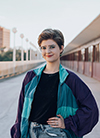 Undergrads Experience Materials Science Research Courtesy of the I-MRSEC REU
Undergrads Experience Materials Science Research Courtesy of the I-MRSEC REU
June 16, 2021
Ten undergraduate students who signed up for the I-MRSEC (Illinois Materials Research Science and Engineering Center) virtual Research Experience for Undergraduates (REU) are spending the summer of 2021 discovering what research is like. In addition, they're being given the opportunity to build a network plus gain skills that they'll most likely find helpful down the road—whether they go into a career in science or not. Participants are also hopefully getting a better idea of what they want to do career-wise. Some may even be determining whether grad school might be in their future, or if research—specifically Materials Science research—might be the career for them.
 POETS Young Scholars Find Sun Buckets Summer Research Experience Meaningful
POETS Young Scholars Find Sun Buckets Summer Research Experience Meaningful
August 27, 2020
Two Champaign Central High School students, Jasmine O’Connor and Lily Weaver, spent the summer socially distancing yet doing research that could make a difference for folks around the world. Part of the NSF-funded POETS (Power Optimization for Electro-Thermal Systems) Engineering Research Center’s Young Scholars program, the two used Sun Buckets technology, which harnesses the power of the sun to use in cooking, to conduct research about drying a variety of common foods. In addition to learning a whole lot about how Sun Buckets work, they gained confidence, plus skills in problem solving and time management. The two also learned how to present research—then actually did so at POETS' virtual end-of-the summer final poster session. Plus, both gained a much clearer understanding of what careers they might be interested in pursuing in the future.
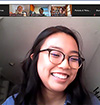 I-MRSEC’s Virtual REU Undergrads Gain Knowledge, Skills, and Insights into Their Future Careers
I-MRSEC’s Virtual REU Undergrads Gain Knowledge, Skills, and Insights into Their Future Careers
August 7, 2020
Although the COVID-19 pandemic precluded I-MRSEC (the Illinois Materials Research Science and Engineering Center) from hosting the residential REU (Research Experience for Undergraduates) intended for summer 2020–—undergraduate students physically conducting research in Illinois labs—the eleven undergrads from all across the U.S. who participated appeared to have benefitted immensely. What kind of impact did participating in the I-MRSEC REU’s virtual counterpart have on the undergrads? In addition to conducting cutting-edge research in one of Illinois’ labs—virtually—mentored by an I-MRSEC faculty member and/or a Ph.D or post-doc researcher, they presented their results at I-MRSEC's Undergraduate Symposium. Plus, students also gained other benefits from the REU: some became adept at using new software; others gained confidence; still others gained a clearer understanding of the direction they plan to go careerwise—including materials science research—all thanks to I-MRSEC’s Virtual REU.
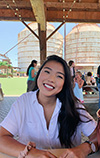 I-MRSEC’s Virtual REU to Expose Undergrads to Research, Provide Training in Needed Skills
I-MRSEC’s Virtual REU to Expose Undergrads to Research, Provide Training in Needed Skills
May 29, 2020
Eleven undergraduate students are participating in the I-MRSEC (Illinois Materials Research Science and Engineering Center) virtual REU this summer from May 27th through July 31st, 2020. However, due to the COVID-19 pandemic, the REU isn't business as usual (in-person interactions with researchers while conducting research in one of Illinois’ state-of-the-art labs). However, the students will still gain valuable experiences. They'lll still have face-to-face interactions with researchers (via Zoom?) while conducting research; they'll still be collecting and analyzing their data and presenting their results. And just like last year’s program, they will still do networking, plus gain other useful information and skills related to research and preparing for a career in STEM…all done virtually!
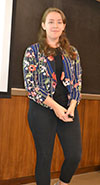 I-MRSEC REU Teaches Carmen Paquette a Lot About Magnetism, Research, and Herself
I-MRSEC REU Teaches Carmen Paquette a Lot About Magnetism, Research, and Herself
August 23, 2019
Carmen Paquette had a lot of takeaways from her experience in the I-MRSEC (Illinois Materials Research Science and Engineering Center) Research Experience for Undergraduates (REU) this past summer. For one, the rising junior, a Material Science and Engineering major at the Illinois Institute of Technology in Chicago, learned a lot about both magnetism and material science. She also discovered what engineering research is like—lots of iterations and lots of thinking outside the box. She also grew personally, learning not to procrastinate, but to “Just do it!” And while she didn’t necessarily figure out if grad school is in her future, she did decide to just follow her heart and go full STEAM ahead when it comes to the things she’s passionate about.
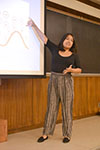 I-MRSEC REU Exposes Undergrads to Materials Science, Research, and What Grad School Is Like
I-MRSEC REU Exposes Undergrads to Materials Science, Research, and What Grad School Is Like
August 20, 2019
For ten weeks this past summer, eleven undergraduate students from all over the US showed up at Illinois to participate in I-MRSEC’s second Research Experience for Undergraduates (REU) program. As part of the experience, they not only conducted a research project, but they completed a paper and gave a final presentation. Of the 11 students, five were from Illinois (mostly from the Chicago area); six were from out of state (Tennessee, Oregon, Texas, and California). And although none of them are currently Illinois students, after experiencing what cutting-edge research at Illinois is like, some will most likely be applying to grad school here.
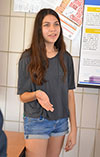 Uni High Sophomores Build Infant Incubators Courtesy of POETS-RET-Developed Curriculum
Uni High Sophomores Build Infant Incubators Courtesy of POETS-RET-Developed Curriculum
June 11, 2019
During the spring semester, as a part of the POETS RET program’s ongoing curriculum development, University Laboratory High School (Uni High) students in science teacher David Bergandine’s chemistry classes tried out POETS’ Infant Incubator curriculum. Here's the scenario: students were to develop an infant incubator which could be used in the developing world in places where folks often can't use electricity. And because this was for a chemistry class, they were to use a chemical reaction to generate heat. Also as part of the curriculum, they were to create a poster and present at an end-of-the semester poster session, complete with judges and prizes.
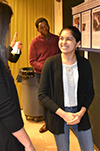 POETS Young Scholars Program Attracts High Schoolers to Research
POETS Young Scholars Program Attracts High Schoolers to Research
May 28, 2019
POETS’ Young Scholars program does just what its name implies—it gives high school students the opportunity to engage in scholarly pursuits—conduct research and learn what it means to be part of a research team—just like their older counterparts. In fact, they’ve even gotten to present their research in a number of venues, including Young Scholars’ end-of-summer poster session, at the Emerging Researchers National Conference (ERN), and most recently, to the Champaign School Board. And for three local youth who have been a part of the program, Neha Hebbar, Darius Jackson, and Kerene Kombe, this extensive exposure to academia has pretty much sealed the deal: at least two of them want to continue the research path they’ve been pursuing once they get to college, and maybe even further.
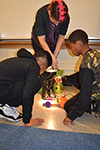 Becerra and Muskin Expose Wiley Fifth Graders to Engineering Via Fun Solar Projects
Becerra and Muskin Expose Wiley Fifth Graders to Engineering Via Fun Solar Projects
March 7, 2019
On most Tuesday mornings since the end of January, Tanissa Tutwiler's 5th grade class at Wiley Elementary has been learning some things about mechanical, electrical, even environmental engineering via some cool hands-on projects, including making a solar cell and designing a solar car. The activities were presented by a couple of Illinois staff who are passionate about STEM education: Natalie Becerra, who currently works as Extra Help for the Graduate Office in Academic Affairs, but who dreams of doing STEM outreach permanently, and Joe Muskin, the Education Coordinator of the Mechanical Science and Engineering Department.
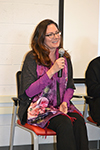 How Tweet It Is! I-MRSEC Workshop Helps Scientists Incorporate Twitter into Their Scientific Communication Repertoire
How Tweet It Is! I-MRSEC Workshop Helps Scientists Incorporate Twitter into Their Scientific Communication Repertoire
November 20, 2018
Are you passionate about communicating science, but a bit behind on the latest technology, like Twitter? Do you have an inkling what Twitter is and does, and are interested in finding out about how Twitter might be helpful to you as a scientist? Do you have a Twitter account, but haven’t quite gotten the hang of how to use it? A number of university folk who fit in one or more of the above categories showed up at the Physics Interaction Room on November 14th for a workshop: “Social Media for Scientists: #Tweetyourscience.” As the title implies, workshop participants hoped to find out more about how they might use social media—especially Twitter—to communicate science. Sponsored by I-MRSEC (Illinois Materials Research Science and Engineering Consortium), Beckman Institute 21st Century Scientists, and Illinois’ Graduate College, the workshop featured a talk by the Grad College’s Mike Firmand, a panel of researchers from Illinois’ science community who have a good Twitter following, plus some small groups based on participants’ level of Twitter expertise.
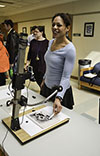 I-MRSEC: Creating a Multidsciplinary Materials Research Community
I-MRSEC: Creating a Multidsciplinary Materials Research Community
March 15, 2018
"The more that people understand the scientific basis of the world and of their lives and of what people are doing and researching and care about, the more we care about each other and the more we support each other." – Nadya Mason
Begun in September 2017, I-MRSEC (Illinois Materials Research Science and Engineering Center), a new NSF-funded center, seeks to create a community around multidisciplinary materials science research, recruiting and educating the next generation of researchers, including diverse students, and informing the general public through outreach. Funded through NSF’s Division of Materials, the Center will receive $16 million over the six years of the grant, with the possibility of being renewed.
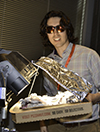 POETS Seminar, ENVISION, Seek to Get Grad Students Hooked on Outreach
POETS Seminar, ENVISION, Seek to Get Grad Students Hooked on Outreach
April 26, 2017
The objective of the contest? To use a pizza box to build a solar oven capable of heating up a marshmallow to the hottest temperature possible. But in a room full of 50 or so talented and competitive engineering graduate students from four POETS universities, the challenge wasn’t so much the design itself. It was about finishing first and getting one of the coveted, optimal spots in front of a limited number of lights!
FULL STORY
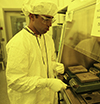 MNTL and its Role in Shaping our Future
MNTL and its Role in Shaping our Future
July 18, 2016
The Micro and Nanotechnology Laboratory (MNTL) at the University of Illinois at Urbana-Champaign, one of the largest and most advanced facilities of its kind in the country, home to 16 cleanrooms, 46 general purpose labs, as well as a biosafety level-2 complex, is playing a significant role in solving real world problems and helping bridge the gap between the developing and developed world.
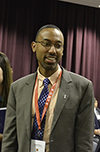 POETS, New NSF Center at Illinois, Poised to Revolutionize Electro-Thermal Systems
POETS, New NSF Center at Illinois, Poised to Revolutionize Electro-Thermal Systems
October 19, 2015
"The new Center...uniting expertise across disciplines, will focus research on what truly is possible and achievable rather than working within the limitations of what currently exists. And what better place to do it than the University of Illinois?” –University of Illinois President Timothy Kileen
Marking the official beginning of the $18.5 million, NSF-funded POETS (Power Optimization for Electro-Thermal Systems) Engineering Research Center, National Science Foundation (NSF) and University leaders, POETS collaborators, and interested members of the University community attended the October 15, 2015 “Kickoff Event.” Headed up by PI Andrew Alleyne, Ralph & Catherine Fisher Professor in Mechanical Science and Engineering, the Center’s goal is to improve the power density of next generation electro-thermal systems.
FULL STORY
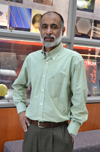 The Face of Nanotechnology at Illinois, CNST Promotes Interdisciplinary Collaboration
The Face of Nanotechnology at Illinois, CNST Promotes Interdisciplinary Collaboration
September 14, 2012
Illinois' Center for Nanoscale Science and Technology (CNST) works to provide training and to foster collaboration in nanotechnology at the intersection of engineering and biology. Why should engineers need to learn about biology? According to Irfan Ahmad, Executive Director of CNST, the national academies have identified the 21st century as the century of biology.
FULL STORY
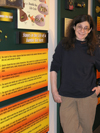 Folks From Cradle to Retirement Home Connect With Nature at Pollinatarium
Folks From Cradle to Retirement Home Connect With Nature at Pollinatarium
May 1, 2012
Imagine a lush green prairie oasis filled with wildflowers. Bees are busily buzzing. Hummingbirds are hovering. A butterfly in search of nectar gracefully floats through the air to alight upon a brightly-colored blossom. Imagine a place where, armed with butterfly nets, "city folks" longing to escape the concrete can get back to nature. Although it sounds too good to be true, it's not an imaginary place; it's Illinois' Pollinatarium, and it's just a few minutes away on the southern edge of campus.
STORY
 New Center for Agricultural, Biomedical, and Pharmaceutical Nanotechnology (CABPN) To Target Biotechnology
New Center for Agricultural, Biomedical, and Pharmaceutical Nanotechnology (CABPN) To Target Biotechnology
February 10, 2011
The new Center for Agricultural, Biomedical, and Pharmaceutical Nanotechnology (CABPN) is an NSF Industry/University Cooperative Research Center designed to enable discovery and innovation through collaboration. CABPN's mission is to conduct industrially-relevant fundamental research into applications of nanotechnology in the fields of drug development, agriculture, and medical technology; to facilitate technology transfer to industry; and to enhance graduate education and research.
FULL STORY
 Illinois’ Pollinatarium, a Discovery Science Center, is abuzz about pollination
Illinois’ Pollinatarium, a Discovery Science Center, is abuzz about pollination
October 23, 2009
Illinois’ new Pollinatarium is the first free-standing Discovery Science Center in the nation devoted to flowering plants and their pollinators.
STORY













.jpg)
















